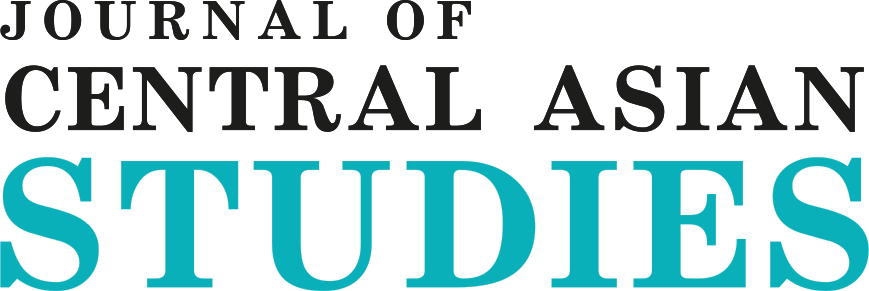«Өзбекстан–2030»: Орталық Азиядағы тұрақты даму үшін экономикалық дипломатия мен өңірлік интеграцияны қатар ілгерілету
DOI:
https://doi.org/10.52536/3006-807X.2025-3.004Кілт сөздер:
Орталық Азия, экономикалық дипломатия , тікелей шетелдік инвестиция , жасыл экономика , инфрақұрылым , аймақтық интеграция , тұрақты даму , саудаАңдатпа
«Өзбекстан–2030» стратегиясы — елді бәсекеге қабілетті әрі тұрақты дамыған мемлекетке айналдыруды мақсат еткен маңызды ұлттық даму бағдарламасы. Бұл мақалада аталған стратегияның негізін құрайтын екі бағыт — экономикалық дипломатия мен өңірлік интеграция мәселелері қарастырылады. Стратегияның басты мақсаттары, негізгі нәтижелік көрсеткіштері және соңғы іске асыру шараларына жан-жақты талдау жасай отырып, мақала Өзбекстанның халықаралық белсенді қатысуы мен өңірішілік ынтымақтастықты күшейту арқылы тұрақты экономикалық өсуді, әлеуметтік әл-ауқатты арттыруды және қоршаған ортаны қорғауды қалай қамтамасыз етіп жатқанын түсіндіреді. Сонымен қатар, мақалада шетелдік тікелей инвестиция тарту, сауда серіктестіктерін кеңейту және көлік, энергетика мен су ресурстарын басқару салаларындағы маңызды инфрақұрылымдық жобаларды жүзеге асыру бастамалары жан-жақты сипатталады. Эмпирикалық деректер мен халықаралық ұйымдардың бағалауларына сүйене отырып, зерттеу Өзбекстанның стратегиялық бағыты бойынша қол жеткізілген жетістіктерді, кездесетін қиындықтар мен болашақ перспективаларды айқындап, елдің Орталық Азиядағы тұрақтылық пен өркендеудің негізгі тірегіне айналуға деген ұмтылысын көрсетеді.
Әдебиеттер тізімі
Acemoglu, D., & Robinson, J. A. (2012). Why Nations Fail: The Origins of Power, Prosperity, and Poverty. Crown Business.
Asian Development Bank. (2024). Asian Development Outlook (ADO) April 2024: Uzbekistan.
Bayne, N., & Woolcock, S. (Eds.). (2017). The New Economic Diplomacy: Decision-Making and Negotiation in International Economic Relations (4th ed.). Routledge.
China Daily. (2024, May 17). Uzbekistan, China vow to strengthen cooperation. https://english.www.gov.cn/news/202405/17/content_WS664687d0c6d0868f4e8e19c0.html
Forbes. (2025, June 3). Why Uzbekistan Is the Next Big Investment — And Digital Leads The Way.
Frankel, J. A. (1997). Regional Trading Blocs in the World Economic System. Peterson Institute for International Economics.
Gov.cn. (2024, December 27). Kyrgyzstan, Uzbekistan, China sign agreement on railway construction.
https://english.www.gov.cn/news/202412/27/content_WS676eabb1c6d0868f4e8ee51f.html
Gov.uz. (2024a, April 30). Uzbekistan strengthens strategic partnership with European countries. https://gov.uz/en/eco/news/view/36421
Gov.uz. (2024b, February 7). State Program for Implementation of "Uzbekistan - 2030" Strategy in the Year of Environmental Protection and "Green" Economy. https://gov.uz/en/eco/news/view/35465
Gulf News. (2024, December 16). Why rail link Pakistan to Uzbekistan via Afghanistan is important. https://gulfnews.com/world/asia/pakistan/why-rail-link-pakistan-to-uzbekistan-via-afghanistan-is-important-1.500149175
Hurrell, A. (2007). On Global Order: Power, Values, and the Constitution of International Society. Oxford University Press.
International Crisis Group. (2020). Uzbekistan's New Foreign Policy: The Diplomacy of the "New Uzbekistan". Europe and Central Asia Briefing No. 90.
International Energy Agency. (2023). Uzbekistan Energy Outlook 2023. https://www.iea.org/countries/uzbekistan
International Monetary Fund. (2024). Republic of Uzbekistan: 2024 Article IV Consultation. IMF Country Report No. 24/210. https://www.elibrary.imf.org/downloadpdf/view/journals/002/2024/210/002.2024.issue-210-en.pdf
IT Park Uzbekistan. (2024). About Us. https://it-park.uz/en/about
International Water Management Institute (IWMI). (2024, May 14). Water cooperation in Central Asia: The role of the International Water Management Institute.
Lee, D., & Hocking, B. (2011). Economic Diplomacy. In R. G. Patman & S. G. H. Hoadley (Eds.), The Oxford Handbook of International Relations. Oxford University Press.
Linn, J. F. (2004). Central Asia: A New Great Game? Carnegie Endowment for International Peace.
Mattli, W. (1999). The Logic of Regional Integration: Europe and Beyond. Cambridge University Press.
Ministry of Ecology, Environmental Protection and Climate Change. (2024, July 1). The Ministry of Ecology announced the results of work for the first half of 2024.
Ministry of Investment, Industry and Trade (MIIT). (2023). Uzbekistan 2030 Strategy Highlights. https://dev-portal.miit.uz/en/why-uzbekistan/2030-strategy-highlights
Pomfret, R. (2023). The Central Asian Economies in the Twenty-First Century: Pacing the Challenges of Globalisation. Routledge.
Power Uzbekistan. (2024, May 24). The share of renewable energy sources in electricity generation in Uzbekistan will reach 18% by the end of 2024 - Minister. https://power-uzbekistan.uz/en/news/the-share-of-renewable-energy-sources-in-electricity-generation-in-uzbekistan-will-reach-18-by-the-end-of-2024--minister
Presidential Decree No. PF-158. (2023, September 11). On the Uzbekistan-2030 Strategy. https://lex.uz/docs/-6600412
Saner, R., & Yiu, L. (2005). International Economic Diplomacy: Mutual Gains and Gains from Mutuality. Centre for Socio-Eco-Nomic Development.
Stiglitz, J. E. (1998). Towards a New Paradigm for Development: Strategies, Policies, and Processes. Prebisch Lecture at UNCTAD, Geneva.
The Diplomat. (2025a, March 2). Uzbekistan-Pakistan: Expanding Trade Amid Connectivity Challenges. https://thediplomat.com/2025/03/uzbekistan-pakistan-expanding-trade-amid-connectivity-challenges/
UNICEF. (2024). UNICEF Annual Report 2024: Uzbekistan.
United Nations. (2015). Transforming Our World: The 2030 Agenda for Sustainable Development. A/RES/70/1.
United Nations Conference on Trade and Development (UNCTAD). (2024). Uzbekistan and WTO accession.
United Nations Economic Commission for Europe (UNECE). (2023, June 29). Uzbekistan leads Central Asia in trade facilitation implementation.
United Nations Economic Commission for Europe (UNECE). (2024, May 17). Better air pollutant and greenhouse gas emission data for Uzbekistan with support from UNECE. https://unece.org/climate-change/news/better-air-pollutant-and-greenhouse-gas-emission-data-uzbekistan-support-unece
United Nations Sustainable Development Group (UNSDG). (2025). Uzbekistan UN Cooperation Framework 2026-2030 Results Framework. https://unsdg.un.org/sites/default/files/2025-05/Uzbekistan%20Cooperation%20Framework%202026-2030%20Results%20Framework.pdf
Uzbekistan Direct Investment Fund (UzDIF). (2024). About Us.
Uzbekistan.org. (2024, May 22). Uzbekistan takes bold steps to address water scarcity. https://uzbekistan.org/uzbekistan-takes-bold-steps-to-address-water-scarcity/4551/
World Bank. (2023). Regional Connectivity in Central Asia: The Belt and Road Initiative and Beyond.
World Bank. (2024a, April 3). Uzbekistan economic update: April 2024.
World Bank. (2024b, June 28). Uzbekistan's Foreign Investment Inflow to Increase by Over 60% in 2024.
World Bank. (2024c). Uzbekistan: Country Economic Memorandum 2024-2025. https://www.worldbank.org/en/country/uzbekistan/publication/cem-2025
World Bank. (2024d, October 25). World Bank Supports Uzbekistan’s Energy Sector Transformation with $100 Million Loan.
World Bank. (2024e). Doing Business in Uzbekistan: An Investor's Guide.
World Bank. (2024f, February 15). Uzbekistan: Air Quality Assessment and Roadmap for Improvement.
World Bank. (2025a, February 19). Uzbekistan Country Partnership Framework (CPF) for 2025-2029.
World Bank. (2025b, May 21). Uzbekistan to Modernize its Irrigation Infrastructure with World Bank Support. https://www.worldbank.org/en/news/press-release/2025/05/21/uzbekistan-to-modernize-its-irrigation-infrastructure-with-world-bank-support
Zabel, L. (2017). Central Asian Regionalism: A Review of the Literature. OSCE Academy in Bishkek.
Жүктеулер
Жарияланды
Журналдың саны
Бөлім
Лицензия
Авторлық құқық (c) 2025 Машарипов Д., Хасанов Ұ.

Бұл жұмыс Creative Commons атрибуты бойынша лицензияланған. 4.0 Халықаралық лицензия.











 Open content is licensed under the CC-BY
Open content is licensed under the CC-BY 